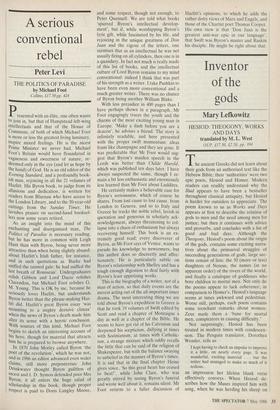A serious conventional rebel
Peter Levi
THE POLITICS OF PARADISE Presented with an dlite, one often wants to join in, but that of Hampstead left-wing intellectuals and that of the House of Commons, of both of which Michael Foot is more or less the greatest living luminary, inspire mixed feelings. He is the nicest Prime Minister we never had. Michael Foot's Britain would have floundered in vagueness and sweetness of nature, re- deemed only in the eye (and let us hope by the hand) of God. He is an old editor of the E. vening Standard, and a profoundly book- ish man, rejoicing in all the 21 volumes of Hazlitt. His Byron book, to judge from its allusions and dedication, is written for readers from Blaenau who have access to the London Library, and to the 30-year-old cuttings from the Sunday Times. He lavishes praises on second-hand booksel- lers now some years retired.
As an insight into the mind of this enchanting and disorganised man, The Politics of Paradise is necessary reading, but he has more in common with Leigh Hunt than with Byron, being never more attractive than when being slightly absurd: about Hazlitt's Irish father, for instance, and in such quotations as 'Burke had sniffed the tainted gale: he had sniffed the hot breath of Rousseau'. Undergraduates relish Gibbon and Lord Dacre relishes Clarendon, but Michael Foot relishes G. M. Young. This is OK by me, because he seriously loves Hazlitt, but understands Byron better than the phrase-making Haz- litt did. Hazlitt's great Byron essay 'was mounting to a mighty derisive climax' When the news of Byron's death made him alter its sense with a heroic conclusion. With sources of this kind, Michael Foot begins to sketch an interesting account of his hero, though for material that attracts him he is prepared to browse anywhere. In 1870 John Morley called Byron 'the Poet of the revolution', which he was not, and in 1986 an editor advanced even wider claims, still more preposterous: John Drinkwater thought Byron guiltless of incest and J. D. Symon defended poor Mrs Byron; it all enters the huge salad of scholarship in this book, though proper respect is paid to Doris Langley Moore, and some respect, though not enough, to Peter Quennell. We are told what books 'spurred Byron's intellectual develop- ment', but if, while worshipping Byron's lyric gift, while fascinated by his life, and rejoicing in the unique greatness of Don Juan and the vigour of the letters, one surmises that as an intellectual he was not usually firing on all cylinders, then one is in a quandary. In fact not much is really made of this list of books, and the intellectual culture of Lord Byron remains to my mind conventional: indeed I think that was part of his strength as a writer. I take Pushkin to have been even more conventional and a much greater writer. There was no chance of Byron being another William Blake.
With less prejudice in 400 pages than I have perhaps shown in a paragraph, Mr Foot engagingly traces the youth and the charms of the most exciting young man in Europe. 'Make a dash before you are a deacon', he advises a friend. The story is infinitely readable, and here presented with the proper swift momentum: ideas foam like champagne and they are gone. It was predictable that Mr Foot would sug- gest that Byron's maiden speech in the Lords was better than Childe Harold, which was published ten days later. I have always suspected the same, though I re- main a bit less enthusiastic and enormously less learned than Mr Foot about Luddites.
He certainly makes a believable case for Byron's seriousness, which of course he shares. From lost cause to lost cause, from London to Geneva, and so to Italy and Greece he tracks the noble rebel, lavish in quotation and generous in scholarly ack- nowledgement, always threatening to col- lapse into a chaos of enthusiasm but always recovering himself. This book is an ex- tremely good read; every discoverer of Byron, as Mr Foot says of Venice, wants to parade his knowledge to newcomers, but this author does so discreetly and affec- tionately. He is particularly subtle on Byron's relationship with Shelley and has a tough enough digestion to deal fairly with Byron's least appetising works. This is the biography of a writer, not of a man of action, so that daily events are the merest acting out of the all-important inner drama. The most interesting thing we are told about Byron's expedition to Greece is that he took 19 volumes of Swift edited by Scott and read a chapter of Montaigne a day as well as a chapter of the Bible. He seems to have got rid of his Calvinism and deepened his scepticism, dallying at times with Socinianism, at times with Catholic- ism, a strange mixture which oddly recalls the little that can be said of the religion of Shakespeare, but with the balance swaying to unbelief in the manner of Byron's times. It is sad that in the final chapter Heine gives voice, 'So this great heart has ceased to beat!', while John Clare, who was greatly stirred by seeing Byron's funeral and wrote well about it, remains silent. Mr Foot returns to a fuller discussion of Hazlitt's opinions, to which he adds the rather dotty views of Marx and Engels, and those of the Chartist poet Thomas Cooper. His own view is that 'Don Juan is the greatest anti-war epic in our language', that Swift was Byron's master and Ruskin his disciple. He might be right about that.






















































 Previous page
Previous page